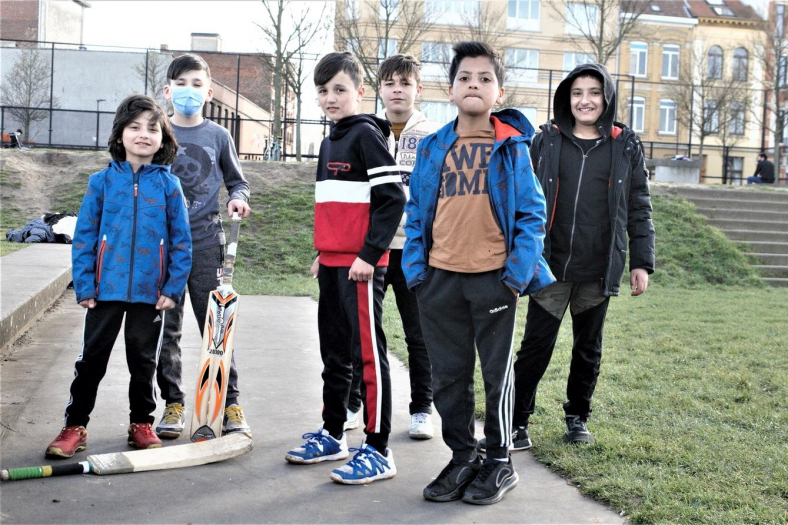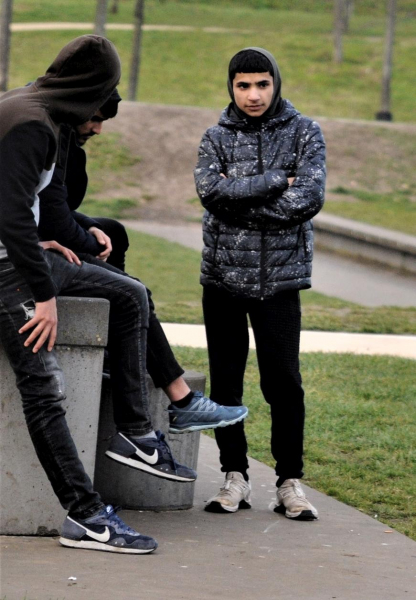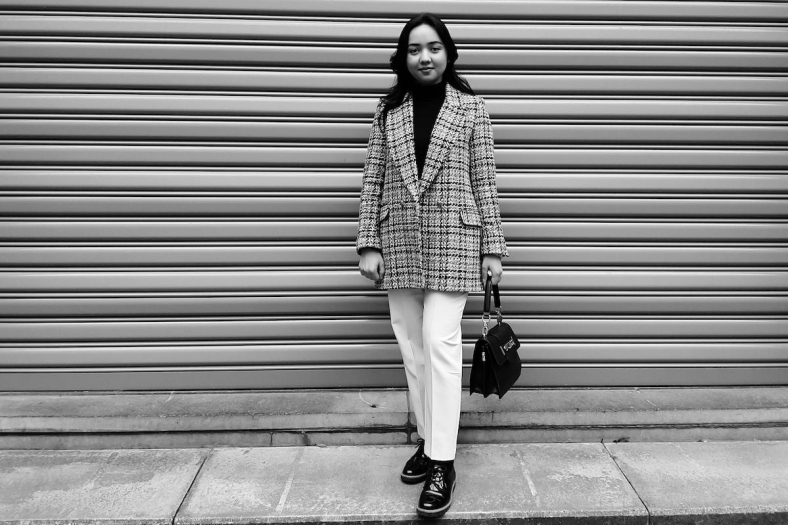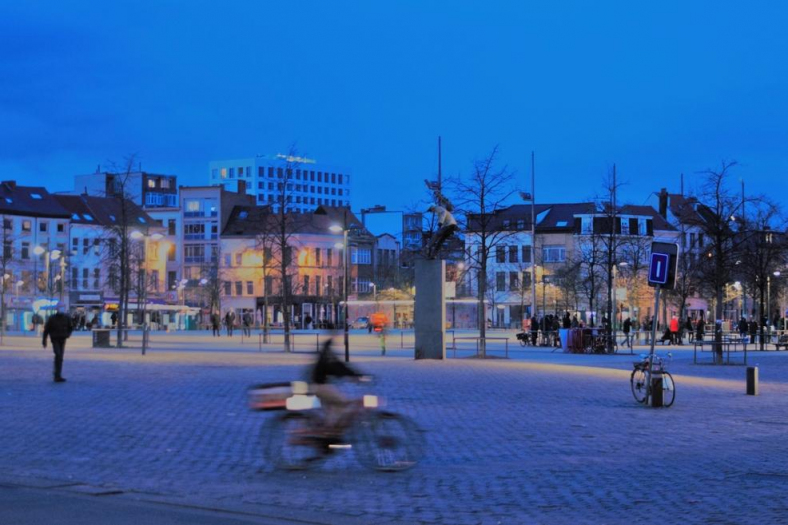Gie Goris was van december 1990 tot september 2020 voltijds actief in de mondiale journalistiek, eerst als hoofdredacteur van Wereldwijd (1990-2002), daarna als hoofdredacteur van MO* (2003-juli 20
‘Not everyone has the strength to carry their heavy backpack’

© Hussainy Qudratullah
The Afghan community in Antwerp (and in Belgium) is predominantly young, male and single. And hurt by a violent past. Should we be worried about the boys? Will the girls find opportunities? Portrait of a new generation of Antwerp citizens, with double A.
A whole new world opens up for 26-year-old Hasrat Irfanullah when we step into the Antwerp Zoo. He has been living in the city for four years, but has not gotten to know the rhinos, giraffes and gorillas. He especially likes the lion, he says, because of its strength.
But the king of the animal kingdom remains petulant — or sleepy — with his sturdy rear end facing the public, while the lioness neatly lays down on a platform to please the photographing visitors. You don’t always get to see what you long for. That experience is not at all foreign to Hasrat, who hails from the poor Afghan province of Nangarhar.
You don’t always get to see what you long for. That experience is not at all foreign to Hasrat, who hails from the poor Afghan province of Nangarhar.
Hasrat is one of thousands of Afghans in Antwerp. Most of his peers come from the same region and arrive in Belgium as unaccompanied minors. Like Ahmad Zia, for example. He just turned 18 and his residence papers still smell of fresh printing ink. He left in September 2016 and arrived in Belgium after a journey that lasted seven months and ten days — he has kept a very precise record: the bad treatment in Iran, the calm in Turkey, the brutal and violent humiliations in Bulgaria, the border crossings to Croatia, Slovenia, Italy and France, the two long years without valid papers in Belgium. Zia talks about it all in short sentences.
Most Afghan youths don’t mince words about the journey from their war-torn country, where they are pressured to choose sides, to where they find a safer place from where they can send financial aid to the family left behind at home. In addition, they sometimes have to pay back thousands of euros, as the crossing to Europe is expensive.
On New Year 2020, there were 7535 of them, today there must be more than 8500: legally residing and registered people of Afghan origin, the fifth nationality group in the city by the river Schelde. Within that “community” there are far more men than women (4681 versus 2791) and the center of gravity can be found in the middle of the age pyramid (1215 young people between the ages of 18 and 25, 2590 adults between 25 and 39 years of age.
A heavy backpack
‘Making the crossing’ almost sounds as if the Afghan youth took a sailboat to get to Belgium, out of concern for the climate or to add some color to a once-in-a-lifetime adventure. The reality is much grimmer. For Hasrat Irfanullah and Ahmad Zia, but also for Davud Mirza. He arrived in Belgium in 2008, a few months before his eighteenth birthday.
When he filed his protection application here, he had been “on the road” for five years. As a thirteen-year-old, he traveled to Iran from the blue city of Mazar-e-Sharif to look for work. His father had been crippled by the Taliban, who had wreaked havoc in the city in the 1990s, particularly among the Hazara population. ‘In Afghanistan I saw one genocidal attack after another on my family and people,’ says Davud. ‘In Iran, I worked more than sixteen hours a day in a handbag factory, where I had to sleep under the sewing machine.’ He talks about it seemingly impassively, but adds that they are all scars, or rather wounds that have not healed. ‘We cannot afford to dwell on the violence we have seen and endured. We have to move on,’ he says. Yet he knows from his own experience that you can’t keep repressing that past.
‘We cannot afford to dwell on the violence we have seen and endured. We have to move on.’
‘If these young people are not invested in now, I fear that tomorrow they could become the new generation of “problematic youth.”’ Shakerullah Nanikhel, a shopkeeper and driving force behind one of the Afghan mosques in Antwerp North, succinctly put into words what just about every older Antwerp Afghan said during my research, as soon as the conversation shifted from their own flight and arrival story to the situation of the Afghan community in the city.
Davud Mirza repeated Nanikhel’s warning in different and sharper words: ‘Now is the time for the government to make sure that the new plant in its garden — the rapidly growing Afghan community, with a preponderance of single boys — can grow upright. If it’s not looked after, it risks turning bad,’ he adds. ‘And then you have to know that we are more aggressive than, say, Moroccan boys. We carry the violence of Afghanistan in our souls, and are much more likely to pull a knife to defend our honor.’
Two days later a short report appeared on the biggest newssite in Belgium, hln.be: ‘Stabbing in Roeselare: one victim taken to hospital, several offenders arrested… The circumstances of the stabbing are still unclear. It seems to be a settling of accounts between two groups of Afghan youths from Roeselare and Langemark-Poelkapelle.’ When I mention gangs in an e-mail, Davud immediately corrects me: ‘Afghans don’t work with gangs. It’s about friendship, ethnic difference among Afghans and honor.’ Khatera Shamal, graduate of the Gender and Diversity master program at UGent, puts a few question marks next to Mirza’s ominous warning. According to her, the violence is not so pervasive, and it is more a matter of learned gender behavior than of an inescapable past. Aggressive behavior is considered masculine. So: the more aggressive, the more masculine one acts according to some. These young people need a broader and more diverse interpretation of their masculinity.’
I can’t take any more
Davud Mirza is a survivor, he says. He learned Dutch from day one in the asylum center and kept it up, even when he survived a year and a half “in illegality” around Antwerp’s Sint-Jansplein. It was a matter of respect, he believes: ‘Anyone who comes to visit takes their shoes off.’ That also means: you abide by the rules that apply here. That is not even self-evident for the average Belgian, let alone for people who really have to start from scratch.
As I sat chatting with Ahmad Zia and his friend Waheed Shinwari under an enthusiastically blossoming Japanese cherry tree on one of the warm spring days, the church started chiming five o’clock. ‘We learned that in class,’ Waheed responded. ‘Five strikes of the church bell means five o’clock.’ If you have to learn even something like that in a classroom, it would seem like a hopeless task to know and respect the entire web of rules, histories and conventions of this country. Yet almost all of them see it as the first step toward making a positive contribution to the society they will henceforth also call “home.”
‘We don’t think in terms of me, we think in terms of us.’
Davud Mirza first obtained a diploma at vocational school, but ten years after he arrived in Belgium as an illiterate boy, he studied in Leuven pursuing a bachelor’s degree in Social Work. For his thesis presentation, the university college had to move to the largest hall of the local cinema complex, because more than five hundred people wanted to attend. Subject: the needs of young asylum seekers from Afghanistan.

The first element that draws attention in that study is that just about all the choices of Afghan youth are determined by the importance of their family. ‘That’s indicative of Afghan culture,’ says Mirza. ‘We don’t think in terms of me, we think in terms of us. For the vast majority of young asylum seekers, the need of the family is why they are here.’
Yet Mirza also emphasizes how important peace and privacy are to those young refugees. This seems in contrast to a we-culture in which privacy does not or hardly exist. According to Mirza, it is more about tranquility than privacy as you would understand it in a European sense. ‘They left from very difficult, violent circumstances. They were given a great responsibility, not only to save and protect themselves, but ultimately mainly to find a way to support the family. And they’ve had a tough, lonely journey. They are mentally exhausted when they get here. That’s why they need to rest. They want to catch their breath.’
That rest, other Afghans emphasize, is necessary to learn the language and make a new start. ‘Many are unable to learn Dutch because their heads are literally full. With the past, with the things they have seen and experienced along the way, with the debts that need to be paid off, with their family that stayed behind’, emphasizes Davud Mirza.
‘Their heads are literally full. With the past, with the things they have seen and experienced along the way, with the debts that need to be paid off, with their family that stayed behind.’
One of the things that struck me during conversations with Afghans in Antwerp was the need to keep other Afghans at arm’s length. At the same time, you hear complaints about groups of Afghan youths hanging out in the streets until late. ‘Both things are true,’ Mirza responds. ‘The young newcomers need each other, because they know that the traumas that live under their skin and in their brains are recognized by other Afghan youth. They don’t have to explain anything, they just share that dark past. Once they really arrive, and especially as soon as they have legal documents and even find work, you often see them distancing themselves. From each other and from Afghanistan. At that moment they want to have as little to do with their own painful past as possible.’
Yet inevitably the moment comes when they run into the question: ‘Who am I? Where do I belong?’ One after another the Afghans I talk to confirm this. ‘You can’t keep avoiding your past,’ says Davud Mirza. In his thesis he therefore argues for more and better accompaniment that also takes into account the psychological vulnerabilities of young Afghans. Mirza: ‘Working on mental well-being also means taking big steps in the integration process in this new society.’
The freedom to choose
That the emphasis in every conversation about Afghan youth in Antwerp is on the boys is not bizarre: there are twice as many of them, they are often single, and they have “a heavy backpack” full of emotional pain, as Davud Mirza put it. But there are girls too, and they do remarkably well.
Khatera Shamal sees all around her that Afghan girls often achieve better school results and are more educated than boys. One of the reasons for this, she believes, is that the girls all have reasonably stable home situations. They have parents who take care of them and so they have clear supervision. But that also means: many rules and restrictions, often enforced to protect the good name of the family in the Afghan community.
The shame culture always revolves around the family reputation, and it is girls in particular who are told they have to take care of this — and therefore suffer from it.
Afghan girls fight hard to conquer their own place in Belgian society, as Mariyam Safi, Master of Law and councillor for Groen in Wommelgem, points out. ‘They have to fight against a whole range of cultural norms and restrictions. In families where the mother has already studied, worked outside the home or was otherwise independent, the daughters have it easier, but still… There are always the other Afghans, there are the gossips and the rumors.’ This is also why Mariyam has never had much contact with other Afghans: child quarrels quickly grow into family conflicts and worse. The shame culture among Afghans always revolves around the family reputation, and it is girls in particular who are told they have to take care of this — and therefore suffer from it. ‘The whole community always knows everything,’ Mariyam summarizes.
And yet. When I ask nieces Yasamin Qorbanzada and Parvana Ghorbanzadeh what they like best about Belgium, Yasamin, who is studying nursing and will soon turn 18, answers without hesitation: ‘The freedom. The ability to make your own choices.’ And she’s lucky, she says, that her family is positive about that. She can choose her own field of study, she does not have to wear a headscarf. Parvana, 22 and a student of Political Science at the UA, gives the same answer in a separate interview. ‘Freedom for women, living in peace, making your own choices, taking responsibility for your own life.’ Parvana does the latter, for example, by taking on student jobs: in her father’s supermarket, and by tutoring. And by getting involved as a volunteer.
The ambition that Afghan young women exude is refreshing and promising. When I ask Parvana Ghorbazadeh who her big role model is, she mentions Alexandria Ocasio-Cortéz, Ilhan Omar, Amal Clooney… Strong women with public careers who stand up for the weak. But her real role model, she adds, are her parents: hard-working people who have given her everything she has now.

De grote voorbeelden van Parvana zijn Alexandria Ocasio-Cortéz, Ilhan Omar, Amal Clooney… Maar haar echte rolmodel, voegt ze toe, zijn haar ouders: hardwerkende mensen die haar alles gegeven hebben wat ze nu heeft.
© Hussainy Qudratullah
A dead-end alley in the city
He has always lived alone since arriving in Antwerp, Roman Azizi says. And studied alone, worked alone, built his future alone. That is sometimes difficult, yes, but better than what he sees others doing: ‘They live together with six, eight or more people in a small apartment. It is no surprise they then start drinking or using drugs.’ Davud Mirza also refers to this: if the mental problems of young people are not addressed and brought out in open debate, many end up in destructive behavior: alcohol, drugs, and street violence among themselves.
‘What you won’t see, or almost never will, is Afghan boys stealing. The great emphasis on personal and family honor makes that almost impossible.’
Alcohol and drugs constantly recur as the great nightmare, for both young and old. Is the fact that they are haram not enough to keep Afghans at bay? Surely most of the young people who have arrived in recent years come from traditionally religious villages and tribes along the Afghan-Pakistan border?
Davud Mirza: ‘Not everyone has the strength to carry the heavy backpack that history assigns to them. Besides, most of the time the use of drugs is limited to hashish, which is almost a social drug in Afghanistan. This also explains why it is so easy for some young people to sell the stuff on the street: there is no big stigma attached to it, it happens at home too. What you won’t see, or almost never will see, is Afghan boys stealing. The great emphasis on personal and family honor makes that almost impossible.’

© Hussainy Qudratullah
When I start talking about Afghan boys and drugs with Ahmad Zia and Waheed Shinwari, they confirm the problem, although they warn that it is certainly not common. ‘A lot depends on good ties with the family back home, on the education you already received in Afghanistan, and on the opportunities you can seize here,’ they say.
Roman now has the Belgian nationality, the subsidiary protection he received earlier on is a precarious status. To obtain the Belgian nationality, he first had to work for 465 days, follow Dutch classes and complete an integration course. Roman succeeded in everything. Soon he can think about getting married. His parents insist on this and have already chosen a wife for him. Can he talk honestly with his parents about these things and the problems that life here brings? Not really, Roman says. ‘I don’t want to burden them with my problems, they have a hard enough time in Afghanistan. They’re already worried about me, they’re already sad.’

Everyone is equal
One of the problems you run into as an Afghan newcomer, Azizi says, is racism among some Belgians. At one of his workplaces, in Willebroek, the employer was so negative towards and about foreigners that Roman refused to return there. ‘But you rarely come across it in ways this open and brutal’, he says. More often it is a matter of misunderstanding.
But that’s not how it is. There are at least two Afghan communities as a result of three waves of migration, says Khatera Shamal. The first group came in the 1990s after the fall of the communist government. That was the elite who fled Kabul. The second group came after the Taliban took power, the second half of the 1990s. That was the middle class. The third group, which arrived in the last decade, are mostly unaccompanied minors from the villages and the mountains. They are mostly uneducated and traumatized, and they are under pressure to earn money.
‘Tackling landlords, ensuring accessible and good quality housing. And above all: work much harder on language.’
What should the government do to fully utilize the strength and potential of all these Afghans? Khatera Shamal works for the city of Antwerp, in the Activation Department. She too pleads for much more and better accompaniment for the young people. But also: ‘Tackling landlords, ensuring accessible and good quality housing. And above all: work much harder on language. Those who do not master the Dutch language or have an insufficient command of it have no chance of getting a good and dignified job. And inadequate command of the language traps young people even more in their own circles. Those who speak good Dutch also feel more confident and self-assured to claim their place in society.’
And what is the big dream that keeps Afghan youth going? No doubt there are as many answers to that as there are Afghans. Although, Ahmad Zia and Waheed Shinwari are in full agreement on a dream that others also cherish: ‘That one day the homeland, the motherland, the always-family-country will know peace.’ Until then, and perhaps even after, they are active citizens here. Antwerpers in heart and conviction.
 This article was written with the support of the Pascal Decroos / European Journalism Fund.
This article was written with the support of the Pascal Decroos / European Journalism Fund.
Maak MO* mee mogelijk.
Word proMO* net als 2798 andere lezers en maak MO* mee mogelijk. Zo blijven al onze verhalen gratis online beschikbaar voor iédereen.
Meer verhalen
-
Report
-
Report
-
Report
-
Interview
-
Analysis
-
Report












 Oxfam België
Oxfam België Handicap International
Handicap International